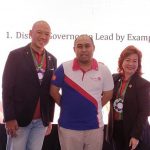“There is a big problem when charity is a substitute for justice.”
Non-governmental organizations (NGOs) are a product of collaborative endeavors of individuals with shared goals and a commitment to social change. Notable for initiating charity projects, the society continues to place them at the forefront of attaining development.
While charitable projects are undoubtedly well-intentioned, they are perceived by some people as band-aids used to cover wounds, yielding temporary relief and ameliorating what is tangible but continues to conceal the underlying causes of the problems. For instance, free medicines relieve the idea of accessible and inclusive health care services. Distributing free groceries can ease hunger for a couple of days. Still, the prevalence of poverty makes it a recurring cycle.
In our pursuit of the common good, we can unintentionally enable the Government to vindicate itself from the responsibility of addressing systemic problems such as corruption, lack of accountability, and inefficiency, which are hindrances to achieving economic community development.
Take, for example, the argument raised by Nelson Levy, that excessive project activities that support services falling under government responsibility may lead to laxity. It can reduce the pressure on the Government to prioritize allocating funds for these services as they feel less obligated, perceiving policy initiation or service provision as unnecessary.
As pointed out by Michelle Ado, government institutions are mandated by the law and funded by the taxes collected from us to provide essential services.
Volunteering at an NGO for years, especially as a Rotaractor, I find fulfillment in charity work. Thus, I am not entirely opposed to it. Instead, I started pondering whether there are alternative means to create sustainable, long-term solutions while simultaneously ensuring that Governments can fulfill their responsibilities.
Our volunteer experiences can serve as a reference to identify critical issues within our community.
Volunteer Experience: Our direct interaction with project beneficiaries gives us invaluable insights into their struggles, concerns, and needs. These shared stories can increase the legitimacy and effectiveness of government policymaking and decision-making as it is grounded in our first-hand experiences with those affected by the policies.
Conceptual map for research-based community assessment execution.
Research-based Community Assessment: We can also begin conducting research for community assessment to craft recommended policies and strategies that we deem necessary, considering our on-the-ground experiences with the community. Likewise, an evaluation of the scope and limitations of the projects can be utilized for initiation and planning.
Source: Developed by the researchers based on Bontenbal, 2009, p. 187
Illustration of how the LGU-NGO collaboration works.
Local Government-NGO Collaboration: NGOs must act beyond conventional gestures to resolve economic community development. Though non-partisan, it does not necessarily preclude involvement in political processes. Presence in meetings and sessions does not evince partisan association. Instead, it is an attempt to transcend the limits of charitable projects, bringing the concerns and needs of the community to a higher level.
The legal framework of the Philippines, particularly the 1987 Constitution and the Local Government Code of 1991, encapsulates the rights of civil society organizations to participate in governance, providing the avenues for “effective and reasonable participation at all levels of social, political, and economic decision-making.” In this sense, governance participatory level is a recognized and guaranteed right.
As volunteers of NGOs, we can do more if we decide to collaborate with them. We can push the Government to be proactive in addressing systemic problems. We can act as intermediaries to ensure social services reach marginalized and vulnerable groups, promoting efficient recourse spending. If we decide to widen our horizons, we can translate our aspirations into policy implementation, generating lasting impacts without worrying often about funding.
Rotaract Club of Santa Maria’s past project and activities.
Our volunteer experiences in creating charitable projects serve as a bridge to identifying specific community issues and promoting more inclusive and informed policymaking. Collaborating with local governments is a manifestation of exercising our legal right to participate in their decision-making process.
The charitable projects deemed “band-aid” solutions should be a wake-up call for us, the volunteers, to not narrowly limit ourselves to one-time big-time projects with a short impact. As Rotaractors, we possess the capacity, knowledge, and resources to pave the way to recognize that problems within the realm of economic community problems have underlying historical, socio-political, and economic factors. To create tangible and meaningful change, we must veer away from what is usual, uncomplicated, and noncontroversial.
Taking bigger steps means embracing complexity and confronting what is ‘feared’ to talk about. Our eagerness, sincerity, and compassion should take precedence. There is nothing to fear if we remain focused on achieving the greater good and remain impartial.
To reiterate, I do not propose the abandonment of charitable projects. It still has the potential to help people and can serve as a learning experience and impetus for collective action. Thus, it can still make a difference, but it is necessary to underscore its limitations and recognize how NGOs can act beyond this.
As we navigate the ethical dilemmas of social change, may we be reminded that the quality of making an impact lies not in concealing wounds but in finding ways to unveil root causes to heal them.




